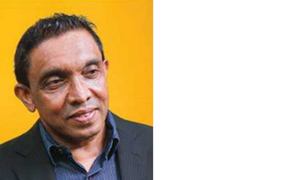
Nov 14 2022.
views 255In a bid to increase government revenue, the Sri Lankan government introduced several more taxes while increasing the already existing direct and indirect tax rates. While proper tax reform hasn’t been done in Sri Lanka, imposing ad hoc taxes is believed to add more financial burden on the people. Economists suggest that Sri Lanka should have an established system to monitor people’s income and wealth to identify who is eligible to pay taxes and who can be exempted.
Taxing people the right way
Economists slammed the previous government for slashing taxes as it is believed to be one of the main reasons that led to the prevailing economic crisis. However several taxes were imposed adding more pressure on people. In an interview with the Daily Mirror Life, Professor of Economics at the University of Colombo, Sirimal Abeyratne explained how people could be taxed the right way.
Excerpts:

Pictured: Sirimal Abeyratne
Q The government has introduced several new taxes while increasing the tax rates. What are your observations regarding this decision?
We should have done this a long time ago without excluding any income earner from income taxes. The newly introduced taxes are now pushing people from the pan to the fire. We don’t have an established system to record people’s income and wealth. Our direct tax income is low against the total tax revenue. This is around 20% whereas in India this is between 30-50%. For the same reasons, we are all contributing to multiple, destructive indirect tax systems. Sri Lanka imposed taxes on international trade or imports. In 2018 we collected about 18% of the import taxes from taxes on international trade. But if we look at the global situation, India collects only about 4.5% import taxes, most high-performing countries such as Malaysia collect less than 2% import taxes and countries such as Singapore and Dubai collect nearly 0% import taxes. When we collect 18% from international trade taxes, Sri Lanka doesn’t become an open economy. Therefore, making these adjustments require an overall tax reform programme which has not yet been done.
Q The VAT for example has been increased from 8-12%. How does this affect people’s income?
Unless we freeze our direct taxes, we must compensate it by increasing the VAT and other indirect taxes. Already, people’s incomes have reduced by 2/3rds within the past 12 months or so. Therefore this is the worst time to have higher VAT taxes and this definitely affects all citizens. The income tax evasion rate is high. Prior to the tax revision, the Inland Revenue Department (IRD) had less than 200,000 active income tax files when this should have been in millions. This shows that millions of people appear to be free riders. There is no law or no efficient system to get people to pay taxes. Collection of income taxes is based on self-declaration and that too is a choice. Therefore we don’t know how many potential taxpayers are willing to pay taxes. The VAT applies to both the rich and the poor in the same manner. However, the tax burden is much higher on the poor. Everybody is affected by indirect taxes. We should have more direct taxes.
Q What are the indirect taxes we are talking about here?
CESS and para-tariffs for example. Para-tariff is a South Asian invention and doesn’t exist anywhere in the world. Sri Lanka came to liberalisation after 1990 and by that time we have had para-tariffs. We lost government income due to liberalisation and due to the war, there was no economic expansion. Therefore India and certain other countries seem to have learned from Sri Lanka. But they have also made sure that they go in line with the World Trade Organisation regulations.
Q Has Sri Lanka done any proper tax reforms previously?
I don’t think we have done a proper tax reform but overnight taxes have been increased and the decisions were gazetted. This has become more of a political game thereby giving uncertainty to the business community. Due to these changes, some of the better-doing businesses have fallen while those that were nowhere in the business community have flourished overnight. But many other countries have a stable tax system that has been established by the government.
Q Are ministers exempted from taxes?
A majority of people are exempted from taxes. The IRD doesn’t have a system to identify potential taxpayers. Ministers’ salaries are below the 100,000 thresholds. Their income doesn’t depend on their salary. They keep their salaries low and earn through other means.
Q What are these taxes being used for?
There are some essential payments to be made. Government sector salaries for instance weren’t reduced even though the private sector reduced its salaries. Then the subsidies and pensions have to be paid. Then there are pending interest payments for previously obtained loans. All these components consume about 90% of government revenue.
Q What are your suggestions to recover from this crisis?
Firstly we need to establish a system like in many other countries to find out the income levels of each and every citizen. This can be a technology-based information system where people’s personal data can be stored safely. With that, the government will be able to clearly identify who can pay taxes, who should be exempted, who should be given Samurdhi and so on. This can be a starting point and a mid-term project for the country. This way the tax rates will be lower and taxes such as CESS, PAL can be eliminated. We therefore can keep the VAT, import and excise duty at lower rates and this may be a better system. We can also introduce property tax because it’s important to maintain some degree of equality among people. This will also leave some money for development purposes while the country can maintain better income taxes with two-three direct taxes.
0 Comments